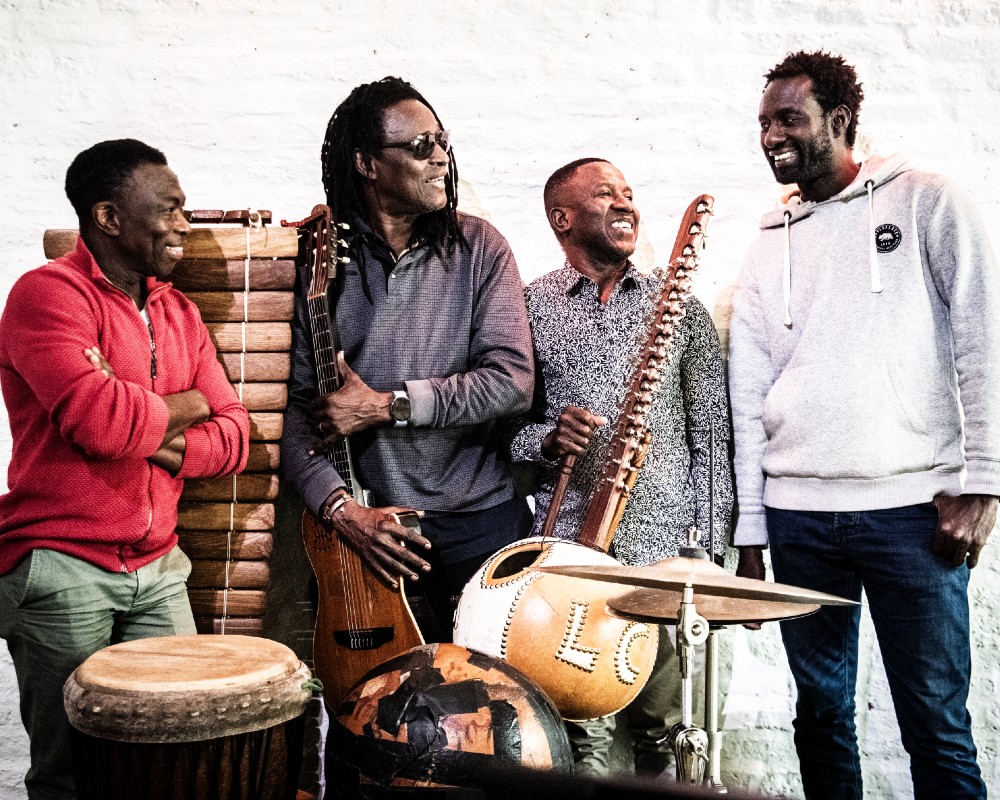
Habib Koité, Aly Keïta, Lamine Cissokho
Mandé Sila
Sunday, November 3, 2024 at 7pm
Global View Series Sponsored by
Worah Family Foundation
This performance is presented without an intermission.
Habib Koité: Guitar
Aly Keïta: Balafon
Lamine Cissokho: Kora
Mama Kone: Calabash and Djembe
Habib Koité
Malian guitarist Habib Koité, one of Africa’s most recognized musicians, comes from a noble line of Khassonké griots, traditional storytellers and musicians. Born into a large family, he learned guitar by accompanying his mother and inherited his passion for music from his grandfather, a kamele n’goni player. Initially on track to become an engineer, Habib switched to music, studying at the National Institute of Arts (INA) in Bamako. After just six months, he became conductor of the school’s band, INA Star.
In 1988, Habib formed his band, Bamada, and gained international attention in 1991 with the hit "Cigarette A Bana." He released his debut album Muso Ko in 1994, followed by Ma Ya in 1998, which topped world music charts and sold over 100,000 copies. Known for his unique guitar style, Habib combines Malian traditions with influences from blues, jazz, and Afro-Cuban music.
Habib has toured extensively, performing over 1,700 concerts globally. He’s collaborated with renowned artists like Bonnie Raitt, Jackson Browne, and Eric Bibb. His albums Baro (2001), Afriki (2007), and Soô (2014) further cemented his reputation. His latest album Kharifa (2019) showcases Malian musical traditions, featuring guest artists like Toumani Diabaté and Sekou Bembeya Kouyate.
Aly Keïta
Aly Keïta, a master of the Balafon, was born in Abidjan, Ivory Coast, and introduced to the instrument at a young age by his father. Recognized globally for his exceptional talent, Keïta has collaborated with renowned artists like Omar Sosa, Joe Zawinul, Pharoah Sanders, and Jan Garbarek, among others. Now based in Berlin, he fuses African rhythms, polyphony, and jazz to create a unique musical experience, characterized by his extraordinary virtuosity.
Keïta's performances are celebrated for their vibrant energy and emotional depth. "I want my music to be alive and full of energy, hope, and love," he says, aiming to share joy with his audiences. His dedication to his craft earned him the 2022 German Jazz Prize for "Special Instruments" and the 2009 World Music Prize Creole in Germany.
Lamine Cissokho
Lamine Cissokho, a griot born in Casamance, Senegal, comes from a renowned family of musicians whose traditions date back to the 14th century. Introduced to the kora as a child by his father, Sana Cissokho, Lamine was also inspired by his grand-uncle, the legendary kora master Lalo Keba Drame. Initially performing traditional Mandingo melodies, he later developed his own compositions, blending Mandingo tradition with jazz, oriental music, and Nordic folk influences.
Lamine has composed and arranged over 200 songs and recorded six albums between 2011 and 2023. His unique style pushes the boundaries of the kora, making him a standout musician. Lamine has toured extensively, performing at major festivals in countries such as Sweden, France, Spain, Germany, Austria, Norway, and Senegal, among others. He has shared the stage with renowned artists like Amadou & Mariam, Youssou N’Dour, and Eric Bibb.
Cissokho's music is a fusion of African, oriental, and jazz traditions, offering both rhythmic energy and meditative calm. He has been honored with several awards, including the "Prix Lalo Keba Drame" in Senegal, Sweden’s "Gyllene Fjädern" in 2020, and the Kalmar County Culture Prize in 2022.
Mama Kone
Born in 1983 in Mopti, Mali, Mama Kone was raised in a family of griots, surrounded by traditional instruments like the balafon, djembe, n'goni, and talking drum. At 12, he began learning the pentatonic balafon, later picking up the djembe with guidance from his older brother. He developed his skills through performances at local concerts and festivals.
After high school, Kone studied drama at the Institut des Arts de Bamako (INA), where musicians like Habib Koité also trained. Despite touring Mali and Europe with theater projects, Kone’s passion for music remained strong, leading him to form a percussion group in Bamako in 2008.
In 2012, Kone’s career took off when Habib Koité invited him to collaborate on the Brothers in Bamako album with U.S. bluesman Eric Bibb. This collaboration led to his contributions on Koité’s albums Soô (2014) and Kharifa (2019). Since then, Kone has been a key member of Koité’s touring band, specializing in the calabash and djembe, while also providing backing vocals.
Outside his work with Koité, Kone remains active in Bamako’s music scene, playing traditional instruments with local groups.